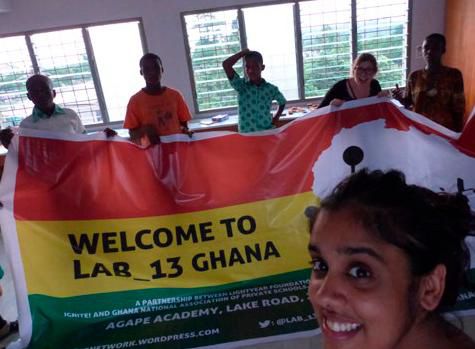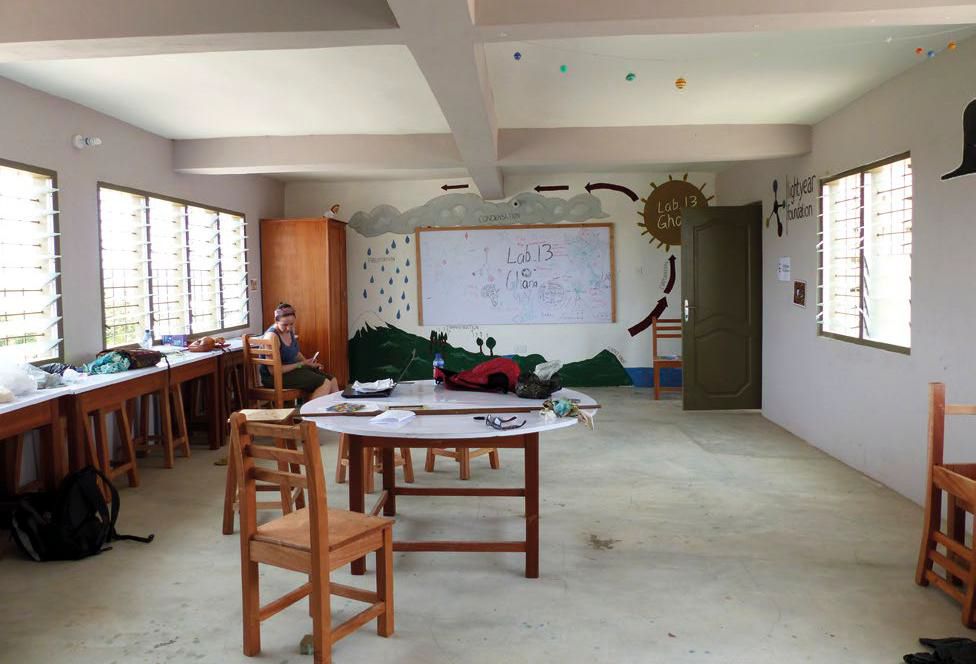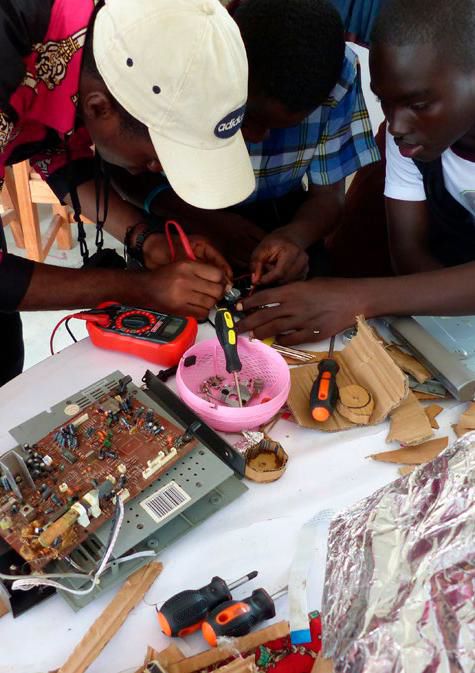
Physiology News Magazine
Lab_13 Ghana
News and Views
Lab_13 Ghana
News and Views
Anisha Tailor
Outreach officer, The Physiological Society
https://doi.org/10.36866/pn.101.14
In March 2016, Anisha Tailor, Outreach Officer at The Physiological Society took a six month sabbatical to work on an education project in Ghana. The project aimed to raise student engagement in science by putting professional scientists in classrooms to support young people in becoming scientists through practical discovery and student led-investigation.

After a class on ‘How do our eyes work?’ I tore off the corner of the plastic water sachet I had been using in my lesson and drank. The pliable bags are the most common containers for drinking water in Ghana. You can buy bottles, but the sealed 500ml sachets are much cheaper and the cool packets could be bought from the heads of hawkers through the window of the bus. I always had a bag on me. I would squash and flatten it in my hand and watch the air bubble move around the packet. I would place it on my head when I was too hot to cool me down. I would pour the water over vegetables to clean them before cooking. There was always a use.
On this particular day, I had been using the sachets to explain sight, and the ability of the lens to adjust its focus by changing shape. My students had peered through the transparent packets, sloshing around the contents as they pulled the bags taught or lay them loosely over snippets of texts making their observations. I took my final sip from the bag in my hand and slipped the plastic into my pocket, tomorrow I could use the empty packet to make a diaphragm for some balloon bottle lungs. This was my life as Scientists in Residence for Lab_13 Ghana.
Last spring I volunteered 6 months of my life to work on a pilot project aiming to establish a ‘proof of concept’ for a new model of science education in resource-constrained environments. I was to set up a lab space based on a network of UK labs called Lab_13, in Ghana. The space would be an area in a school dedicated to the exploration of science through student led enquiry and experimentation. The ethos of the lab was to ignite curiosity in young people by putting them in charge of their own learning through a student led approach to teaching.
Across the world, education is usually teacher led; time and curriculum restraints can often mean that students are taught to pass exams, they learn A and B, but do not take part in the journey of discovering answers themselves. Scientific methodology of hypothesising, observing, experimenting and making conclusions are either put on the backburner or crammed in briefly.
This is especially true for Ghana. While discussing the education system with my Ghanaian colleague, he told me of his own experience going through the country’s education system, stating ‘science teaching is theoretical, notes are written on the board for students to copy, tests are taken periodically, and a final examination is given at the end of the year’. He was a scientist himself, he had attended Kwame Nkrumah University of Science and Technology (KNUST) and had been working as a research assistant looking at agricultural biotech and plant disease diagnostics. It was through extracurricular hands-on activities, field trips, and his own reading about great scientists and discoveries he became inspired to pursue his field of agricultural science.
The Lab_13 model, which in the UK, is used as an Ofsted example of good practice in schools, not only allows students to learn about great discoveries and scientists through books, it puts them in direct contact with scientists themselves. Each lab has its own professional Scientist-in-Residence (SiR), an inventor, maker, a scientific discoverer, whose sole job is to be their normal inquisitive self, and to support students in their own practical endeavours and investigations. The model allows a sort of observational learning, resulting in a diffusion chain of passionate student scientists spreading across a school. Along with three others volunteers I become part of Lab_13 Ghana’s first SiR Team. The students took the lead, and we became their lab assistants, helping them carry out experiments to answer questions such as, why is the sky blue? If it rains from such a great height, why does rain not hurt me? Why don’t I have hair on my hands? Why do foods have expiry dates?
In the 6 months I was in Ghana I worked with local schools and authorities to engage with 30 schools, 700 students and 65 teachers fortnightly. I made brain hats to discuss neuroscience, gathered hibiscus flowers for pH indicator and used glitter to talk epidemics. I saved every bit of my recycling to make lungs, boats, and water filters, and covered my kitchen in flour and food dye for lessons on sea currents and electricity. I watched a passion develop through introducing practical experiments with the use of locally sourced equipment and materials, and saw aspirations soar by the introduction of real scientists into classrooms all over the district.


The Lab_13 model, which had proved successful in the UK, saw an equally incredible student response in Ghana. Translation, however, was not always easy; there are of course always challenges in setting up a pilot project. I had expected tackling misconception present in the country that ‘doing’ science required specialist labs and equipment, or dealing with the culture of students being quiet recipients of knowledge from ‘all-knowing’ teachers to be the biggest, but in fact they weren’t. For me, the biggest challenge didn’t even relate to translating the model, it was my own personal experience of becoming a teacher.
Every two weeks I led sessions for seven schools. I took my students’ questions, created bespoke classes surrounding their interests, researched areas of science in which I was not an expert and sourced inexpensive equipment and resources for my lessons. I assisted my team in their classes and tried to ensure that I was an ever present figure in the Lab, so students could always drop in. My timetable wasn’t full, yet I found myself constantly working, weekdays, weekends, evenings, as did the rest of my team. I had known that this was certainly not an uncommon phenomenon in the teaching profession, but I only had seven sessions every two weeks and I was constantly busy.
In the UK, a typical school timetable would see a teacher working a minimum of 20 sessions over just one week and I found it difficult to even comprehend how the teaching of science with such time constraints on staff time could possibly be kept engaging and practical. For me, I found relief in partnership.
Students and lecturers from KNUST supported the activities of Lab_13 Ghana by taking part in guest lectures, Saturday Clubs, and even becoming mentors to some of our students. While my team and I acted as the daily Scientists-in-Residence, we couldn’t always offer an expert opinion on every topic, nor had the time to become versed in depth. We could encourage inquisitiveness and support a scientific approach to investigation (in fact I actually learnt quite a lot of new and long forgotten science through working with the students in their experiment designs). But sometimes we lacked a deep subject knowledge invaluable in thinking of a perfect analogy, or finding a resourceful way to explain and investigate a problem. This, in addition to a shortage of time, is a common problem for both teachers in Ghana, the UK, and undoubtably much of the world.
In the UK, secondary school science teachers will have a degree in a particular area of science; however, they are expected to engage students across a wide breath of topics not necessarily in their specialist field. Primary school teachers often don’t have a science background at all. Our lab hosted visits from pharmaceutical lectures, electrical engineering students, immunologists, and material scientists, and I experienced first-hand the impact of having the support of a community of professional scientists in enhancing teacher confidence in teaching areas in which they had limited knowledge.
The teachers at my schools told me the work we carried out and the partnerships formed made their students more curious and confident, better able to observe and evaluate, with greater abilities to think rationally and draw conclusions. It was so gratifying to see the effect of only the first 5 and half months of the project, and emphasised to me the importance of forging links between the scientific community and schoolchildren.
As a Society, we share a wealth of knowledge on human and animal physiology and should be supporting the development of future undergraduates, PhD students, postdocs and academics by ensuring we are present at the start, in the formative years of education. A knowledge for, and passion for ones subject, is vital in promoting that passion in others and ensuring the future of a disciple. As a community of scientists who found their path to physiology, I’m sure you can pinpoint the moments where your fascination about the world around you veered you in the direction of this particular scientific study. For me, my joy of science can be tracked back to a vivid memory of the WISE (Women in Science and Engineering) bus parking up in my school’s playground and being invited on to tinker and investigate, coming to the realisation that ‘this is cool’.
I can only hope that this is the effect I brought about in Ghana, and can also catalyse for The Society. This is why I call on the Membership to take arms, become a Physiologist-in-Residence. I’m not asking you to move to a different continent, or become a permanent member of staff at a school; I’m asking you to take your passion to surrounding schools and share it. Support local schools, which may lack the resources, budget or staff time to be able advocate for our field. It is only by investing our time in the future will we be able to create the next generation of high quality physiologists and ensure the continuation of cutting edge research. Become part of the moment, a memory someone can track back to the start of their love affair with science.
